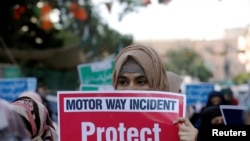WASHINGTON — Thousands of women are set to march in cities across Pakistan on Tuesday to mark International Women’s Day and demand greater rights in the highly conservative, male-dominated society. They are doing so under the slogan, “My body, my right,” meaning freedom in decision-making about subjects like marriage, sex, reproductive health and clothing choices in the Muslim-majority country.
Pakistani women activists also use the occasion to draw attention to promote gender equality, increase pressure on the government to enforce domestic abuse legislation, and demand protections from rape, saying many incidences of rape and harassment go unreported.
The rallies will be taking place under the specter of violence and opposition from religious officials.
Tahira Abdullah and Huda Bukhari, organizers of the women's march in Islamabad, told VOA that the local administration had not yet given them formal permission to stage rallies in the country's affluent capital. The women also say they have received a deluge of threatening letters and phone calls ahead of the March 8 protests.
Separately, the federal minister for religious affairs in Prime Minister Imran Khan’s government has voiced opposition to the rallies.
Noor-ul-Haq Qadri, an elected member of Khan's mainstream Pakistan Tehreek-e-Insaf (PTI) party, suggested in a letter to the prime minister that Tuesday be commemorated instead as International Hijab Day.
The federal minister told Khan that no group should be allowed to ridicule Islamic values, societal norms, hijab, or modesty under the banner of Aurat (woman) or any other title, with acts he says hurt the sentiments of Muslims in the country.
Prime Minister Khan has yet to respond to his minister's suggestion.
The religious minister's suggestion to the prime minister bolstered a pro-Taliban religious-political organization, Jamiat-e-Ulama-e-Islam, Fazal (JUI-F), which issued a warning to would-be marchers.
"If the march was allowed, we will use [a] baton to stop it," the party's hardliner patron, based in Islamabad, warned the government. So far, however, neither the Taliban nor other radical groups in Pakistan have organized an anti-women march, officials say.
In a tweet, @AuratMarch, a verified Twitter handle belonging to women’s rights activists in Pakistan, reiterated to the minister what women will ask for on March 8.
“We ask the Minister for Religious Affairs why he voted against the minimum age of marriage bill in 2019 and the anti-enforced conversion bill in 2020 and 2021?” the tweet read.
Minorities and women activists in Pakistan opposed the contentious legislation, fearing that it would legalize underage marriages and forced conversion of non-Muslims.
At least two federal ministers have implied that they disagree with Qadri’s point of view. Shireen Mazari, the federal minister for human rights, tweeted a summary of an interview she held with a local television station.
“On Women’s International Day, whoever wants to have a woman march or Hijab march, they should go for it. No one has the right to stop a democratic march,” her tweet read.
That message was reinforced by Information Minister Fawad Chaudhry, who told a private television station that there was no reason to prohibit a march so long as there was no violence.
Women’s concerns
The objection to the march by the religious affairs minister sparked outrage among Pakistani women's rights advocates. According to a working female attorney, Mehwish Muhib Kakakhel, the Pakistani religious affairs ministry cannot change the status of the U.N.-declared day, and therefore violates women's fundamental rights.
Kakakhel told VOA, “Article 16 of the Constitution of Pakistan allows freedom of assembly and the letter by a federal minister is a clear violation of the constitution and an attempt to usurp women rights.”
Around five attorneys filed lawsuits against the women marchers during the Women’s March in 2021, accusing them of using "derogatory" words against religious authorities.
Some of the opponents of the women’s march allegedly doctored slogans of the female marchers last year. The organizers later issued a clarification that fake videos were distributed on social media platforms to defame their struggle for rights.
Women in support of the march are occasionally confronted with a countermarch by female students from madrassas, or religious schools. In 2020, female and male Madrassa students in Islamabad threw stones and shoes at those who took part in rallies.
This story originated with VOA’s Deewa service with contributions by Malik Waqar Ahmad and Sadia Qasim Shah from Pakistan.










